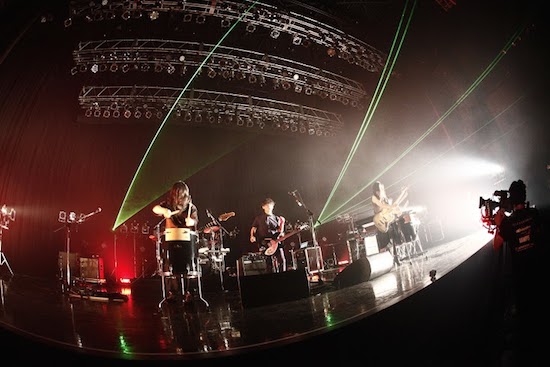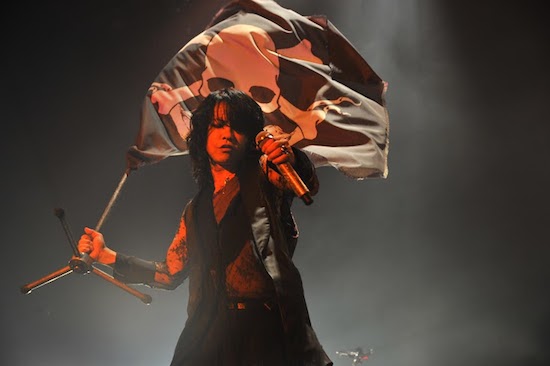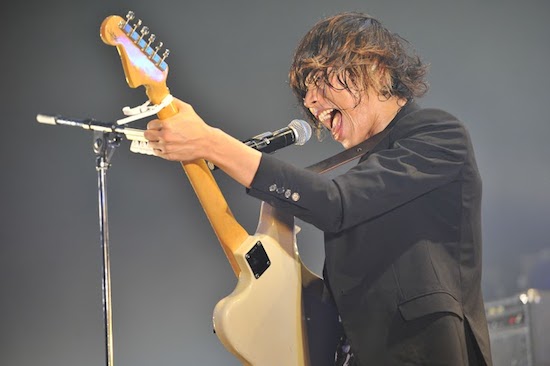The scintillating Sapporo group Sakanaction are playing; their lasers pierce the dry ice, their music pumps like a heart and crackles like synapses. Two women in full kabuki costume (part of the act) join them onstage and throw their own kind of shapes, very possibly making a profound and subversive comment about contemporary Japanese culture. Or maybe they’re just a frill; it’s hard to tell.
Outside in the clean metropolis (technically, it’s not a city, but 23 cities), the Tokyo Skytree, the second highest structure in the world (at 634 metres since 2011) claims the glamour. But it’s generically silver-grey and thus the quaint, 1960s-built Tokyo Tower, much smaller at 333 metres, is cuter and funkier because it’s basically the Eiffel Tower if it was bright orange and therefore more romantic and resonant.
It’s been a giddy few days. After a twelve-hour flight, then a packed train to the edge of the city because a cab from the airport to the hotel would be seventy quid’s worth of yen, my introduction to Tokyo was a taxi driver shrieking at me, his face a picture of alarm. "Don’t touch me!" he shouts. "Don’t touch me!" I’ve only just got into the car, and have no intention of invading his personal space, so I find this contrast to the renowned Japanese good manners a little unnerving. He’s not even one of the many people here wearing those surgical masks. Konichiwa to you too. Turns out he means I’m not to touch IT – i.e. the car door, which closes with an automated swoosh – but the tone is set for some lost-in-translation moments which bejewel the hours here, perhaps the planet’s most exhilaratingly disorientating (to foreigners) modern/futuristic space. Time-zone jetlag and insomnia play their part in fudging the senses.
An explosion of neon lights and electronic buzz and bridges and tunnels and flyovers and train tracks which traverse/dissect roads, Tokyo is populous and palpable, orgiastic yet ordered. The first day, you’re proud of yourself if you manage to cross the road and locate food without getting hopelessly lost. Yet such is its dream-logic that by day three or four you’re making long complex journeys by public transport, feeling, if not at home exactly, not out of place either, enjoying sushi/mocha/sake and bowing at the socially correct times instead of randomly hoping for the best. Tokyo somehow has a system and that system quietly imposes itself and makes sense. From the sexy bustle of Shinjuku to the relative calm of Shiodome, it is remarkably safe. As an ex-pat tells me, despite its incomparable crowds and constant hum, it functions better than London. The Japanese work hard and their stuff works too. In the way of these things, just when you’ve flushed out the jet lag and got it all fathomed out, picked up the rhythm, know how to walk and talk and who to be, it’s time to come home.
We are nominally here for Japan Music Night, the closing event of the TIMM (Tokyo International Music Market 2014), in which Japan proudly showcases its music industry to the world. There are conferences, gigs, and much formal exchanging of business cards. There is a strange fusion of rigid organisation and complete lack of it. Partly because, as a late invitee, I am in a hotel a long way across town from the convention, I am semi-forgotten, left to my own devices to do intrepid exploring for two days. Among other experiences, which I should probably save for my imaginary newly-commissioned BBC4 travelogue series, I get drenched in Blade Runner rain visiting Shinjuku, the busiest station in the world (you’ll have seen the famous crossing in Lost In Translation). It occurs to me gradually that nobody is staring at me. (In China, they do stare at non-locals. Boy do they.) The Japanese, motivated to the max, are fully focused on their own gotta-get-ahead moving and shaking.
I’m in Roppongi, "the nightlife area", the on-map equivalent of, say, Kensington, and the gigantic hotel where TIMM is all going on is in the on-map equivalent of, say, Greenwich. To get there necessitates a regular labyrinthine commute to work of getting the Chiyoda line to Roppongi proper, the Oedo line to Shiodome, then fathoming out the Yurikamome monorail past the Rainbow Bridge to Daiba.
At first this is frustrating and confusing, especially when I keep buying the wrong tickets with my yen, but once familiarised it turns out to be one of those spectacular great-journeys-of-a-lifetime. By the time I’m "catching the last tube home" after the final night’s after-party, I feel an overwhelming gust of mortality, in that the odds I will ever make that journey again are, realistically, very slim. One falls a little in love with the fleeting otherness of it all.

So, the music. The showcases take place at Zepp Diver City in Daiba, which is a typically clean and practically-designed 1000–capacity venue on the second floor of a large shopping mall. Wednesday is billed as a J-Pop night, though the acts are far more diverse and smart than the cartoon kiddie-pop we Brits tend to associate with that "genre" (and which dominates the TV channels and record shops here). The first band I catch and enjoy is JOSY – an all-female, primary-colours, psychedelic rock-pop garage quartet with no guitars but killer bass, a keyboardist who’s clearly fond of The Doors, and a singer who can bounce effortlessly between serious endeavour and child-like talent-show theatrics. I keep referring to them as Josie & The Pussycats afterwards but nobody knows what I’m on about. They’re like Blondie covering The Doors: i.e. much preferable to The Doors. And they encapsulate something that turns out to be true of all the bands we see: they’re exceptionally proficient musicians, almost too perfect and faultless to foster any sonic traction. If they came out of Shoreditch or Brooklyn, they’d be cover stars in the UK within a month. They’re an infectious fun riot.
The highly rated MOLICE unfortunately give a car crash onstage interview with the excitable presenter, in which they suggest they chose their name because they love The Police and The Velvet Underground "whose lead singer is Morrissey". "Awesome!" says the host, but then, clearly modelling herself on UK TV presenters and radio DJs, she says that to everything. Headlining that night are PASSEPIED, a more intense quintet with a dash of enigma, who stretch the genre tags quite pleasingly. Their own press release pamphlet, amid some shaky English, uses the phrase "a hint of Japanese appearing and disappearing between notes", which accidentally hits on something. Vocalist Natsuki Ogoda has a shy (in a good way) presence, as if coached by Lene Lovich or Toyah in how to reboot their style without the irritating bits. Five years and two albums in, Passepied play to big crowds here and nurture their own mythology through artwork which challenges stereotypical Japanese female "roles", from traditional costume to the omnipresent schoolgirl-anime.
Thursday is – it is emphasised firmly – the big one, in which we will be presented with the Tokyo music industry’s three great hopes. Japan Night begins at lunchtime, and a press conference with the chosen triumvirate at a swanky hotel. Our three bands are Vamps, Alexandros and Sakanaction. They’re all quite literally Big In Japan, but the way they’re dramatically brought out, after a portentous intro, flashbulbs popping, to sit behind tables onstage and face questions like they’re George Clooney, is borderline silly. We non-Japanese have simultaneous translators in our earpieces, but even with this added tech-excitement the musicians’ answers are as bland and innocuous as if they’d been groomed by Cowell. There’s a wonderfully awkward moment when an American journalist reasonably asks how these three bands were selected to represent Japan, and the chap in charge gets all tense and defensive, interrupting to say that’s not a matter that’s up for discussion.
Vamps are forty-something black-clad glam-goth-rockers, hugely popular here, sporting a kind of Motley Crue meets Johnny Thunders vibe. The other two bands are younger, good-looking and elegantly dressed, appearing to have spent weeks having their outfits chosen for them. All give polite answers about being happy if their music reaches more territories, but the key drive here is the chap in charge stressing how Japan wants its music business performing better overseas in time for the 2020 Tokyo Olympics. (To this aim Japan Night hopes to travel to USA and Europe around 2016-18.)
The (largely unspoken) question is whether their bands will translate. (Sometimes they sing in English, but not generally). A few years ago you’d still have said no. With globalisation now reaching peak momentum, it seems much more possible. Once, it was a big deal, worthy of comment, if a French/Norwegian/Italian topped the British hit parade. Not any longer. The language barrier is of diminishing importance, and as we increasingly crave and seek out the new, the lesser known, the mysterious but stimulating, then the better, more clued-up and savvy Japanese music has as much chance of breaking through–in pragmatic terms–as do Japanese fashion or food trends.
After an afternoon in which I wander "by accident" into the Tokyo International Film Festival’s meet-and-greet next door and am instantly asked live on air by a TV crew what "my" film is called (caught on the spot, I opt for The Lonely Passion Of My Agony, cinephiles), Japan Night begins. This being Tokyo, the show starts at 6:30pm, ends at 9:30pm. Compared to British mores, it’s all rather tidy and airlessly efficient. Nobody fully loosens up. Yes, tonight is packed with exhilarated and enthusiastic fans (some of whom have been queuing for returns since the morning), but they do their rocking out with a kind of uniform glee-by-numbers. The vast majority of them girls who’ve dressed up for a big night out, at show’s end they all file out promptly and unquestioningly. (Some are wearing black versions of those anti-germ masks as ironic style items. Others wear them to aloofly cut out direct interaction with others, like we might wear headphones). I mean it’s "nice", all this lack of the jostle and aggro and sweat you’d get at a London gig, but it’s a bit like the smoking ban has been extended to an all-round attitude ban.

Each band’s own fan base can be witnessed taking turns to shunt forth and support their heroes. Vamps are slick, sleazy, an accomplished take on the weave of poodle rock and Cult/NIN strains (with maybe a lick of Depeche Mode) that constitutes their DNA. Hyde (vocals, guitars) and KAZ (guitars) have been big news here for years. Hyde is also known as L’Arc-en-Ciel, and KAZ is also known as Oblivion Dust. Hyde has been a character in an anime. They’ve toured the States and Europe, had an international album release, they’re big in Chile. Best-of album Sex, Blood, Rock’n’Roll saw them re-record their stuff in English. They’re certainly giving it a try, this crossing-over idea. I would suggest there are already plenty of home-grown bands fighting over the available louche-throwback rockers niches here, but as actual bona fide anime heroes Vamps sure have a unique selling point.
Oddly, ALEXANDROS are at times almost as heavy. It’s quite shocking when they yell "C’mon motherfuckers!", because from their videos and press conference I’d deduced they were a pretty Emo-light boy-band who’d heard a few la-la-la 90s indie records. But they’re bringing the loud abrasive riffs, the frontman Yoohei Kawakami throwing himself about roughly. Then again, like many Japanese bands, their technical talent and versatility is such that a number that could have been The Darkness is followed by one that could be The Kooks covering The Las. There’s an element of magpie mimicry. It’s clear again that Japanese bands practise practise practise. This is commendable, but presents the worry that their erasure of any rough edges leaves no loose threads for a potential international audience to pick up on, to rub up against. The five-piece, after five years of recording, changed their name from Champagne just earlier this year, "after a request from the Bureau du Champagne, Japan". (Love to have been at that meeting). It hasn’t affected their massiveness here, even if it does highlight their identity confusion. I must relay some of their song titles to you: ‘Where’s My Potato?’, ‘I Wanna Go To Hawaii’, ‘Schwarzenegger’, ‘Me No Do Karate’, ‘Kill Me If You Can’, and ‘You’re So Sweet And I Love You’.
Sakanaction translates as something akin to "the motion of fish", and this clinically cool quintet have switched their sound around over ten years of growing fame in Japan. Their self-titled sixth album went to number one last year, and many of their tracks have featured in high-profile ads and TV shows and films. The brainchild of frontman Ichiro Yamaguchi, the three boys and two girls (actually they’re men and women, but Japanese people look so enviably young) are very different to the two rock outfits, offering euphoric electronica-fuelled dance-pop. Some bands just look great and there’s no two ways around it. Bass player Ami Kusakari, visibly uncomfortable at the press conference (who wouldn’t be?) is one of those people who metamorphose into an enigmatic star onstage.
Sakanaction pull off a neat piece of stagecraft to begin their set. They open with all five standing in a row behind a long desk of laptops and keyboards, and you’re thinking: oh, a robot-y Kraftwerk vibe, interesting. Then there’s dry ice and dimming of lights and without the music stopping they’ve become a stand-up organic band, playing actual old-school instruments, and it’s even more interesting. Matching the professionalism and uber-competence of the previous bands, they have their set’s tempo, its rises and falls, honed to a tee. The crowd know the songs and come as close to gaily losing it as a Japanese audience is likely to. Part rave, part constant shimmer, they build to climaxes with chants and refrains wherein the language is irrelevant because they know how to wrangle a mood. I hear sections which echo Air, the great 80s synth-art bands if they’d all been lucky enough to have Mick Karn on bass, The Polyphonic Spree and, OK, Arcade Fire. They’re that versatile, yet it all flows. There’s no reason other than geography and logistics why Sakanaction’s Esperanto grooves and great guile couldn’t be all-conquering.
They’re a thing of style and substance, and the best sonic summation we hear of today’s thrusting ambitious Tokyo. Arriving back at Heathrow, swimming in sleep deprivation, it filters through to my over-stimulated brain that I could count on the fingers of one hand the number of people over 45 I saw out there, and on the fingers of the other hand the number of kids. Everyone was fashionably dressed; the young women especially so, but even the working men wear sharp suits. You don’t see many jeans. Then I remember that all this did in fact occur to me while out there, but that describing the premise of Logan’s Run to my handler proved to be a fruitless conversational gambit. The next day, back to everyday reality in the supermarket, I think: about 24 hours ago I was staring down the snow-capped cone of Mount Fuji from the window of a plane.
You have to hope Japanese music woos the West and makes the leap over here. It’s a stratovolcano, impatient to erupt.



